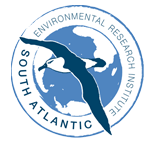This project is ongoing; it commenced in July 2017 and will continue until December 2019.
The purpose of this project is to understand the St Helena pelagic ecosystem and how seasonal or long-term changes in that system will impact the abundance and distribution of the whale sharks and fish on which the economy of the island depends.
The project is investigating the role of the island and its associated seamounts in enhancing productivity and working to understand the links between oceanography and the lower trophic levels which are the foundations of the wider pelagic ecosystem. This is being undertaken through analysis of remote sensing data combined with in situ measurements of temperature and salinity as well as biological sampling targeting zooplankton and secondary consumers. This information will be used to help make ecosystem management based decisions to ensure sustainability for St Helena’s marine environment.
Data will be made available at the end of the project.
Project updates are available through the Environmental Management Divisions (EMD) conservation Facebook page: https://www.facebook.com/sthelenaconservation/
Our Project Partners
British Antarctic Survey (BAS)
(https://www.bas.ac.uk/ and @BASnews)
British Antarctic Survey (BAS) delivers and enables world-leading interdisciplinary research in the Polar Regions. Its skilled science and support staff based in Cambridge, Antarctica and the Arctic, work together to deliver research that uses the Polar Regions to advance our understanding of Earth as a sustainable planet. Through its extensive logistic capability, BAS facilitates access for the British and international science community to the UK polar research operation. Numerous national and international collaborations, combined with an excellent infrastructure, help sustain a world leading position for the UK in Antarctic affairs. BAS also provide scientific support and expert knowledge to research programmes being undertaken in the British Overseas Territories. British Antarctic Survey is a component of the Natural Environment Research Council (NERC). NERC is part of UK Research and Innovation (www.ukri.org).
South Atlantic Environmental Research Institute (SAERI)
(https://www.south-atlantic-research.org/)
SAERI is a Falkland Islands initiative. It aspires to increase and coordinate the volume and impact of environmental research in the South Atlantic by establishing world-class research platforms in each of the SAOTs from the equator to the ice in the Antarctic. SAERI research activities cover a variety of disciplines: marine and terrestrial biology and ecology, geology, oceanography, climatology, geographic information systems (GIS). Within SAERI, the Information Management System (IMS) and GIS data centre was born with the intention of establishing a data strategy for collating, curating and managing existing and future data (environmental and otherwise) in a consistent way across the entire SA region. The GIS data centre aims at building local GIS capacity, skills and knowledge by providing training and courses in open source GIS software and by supporting individual projects.